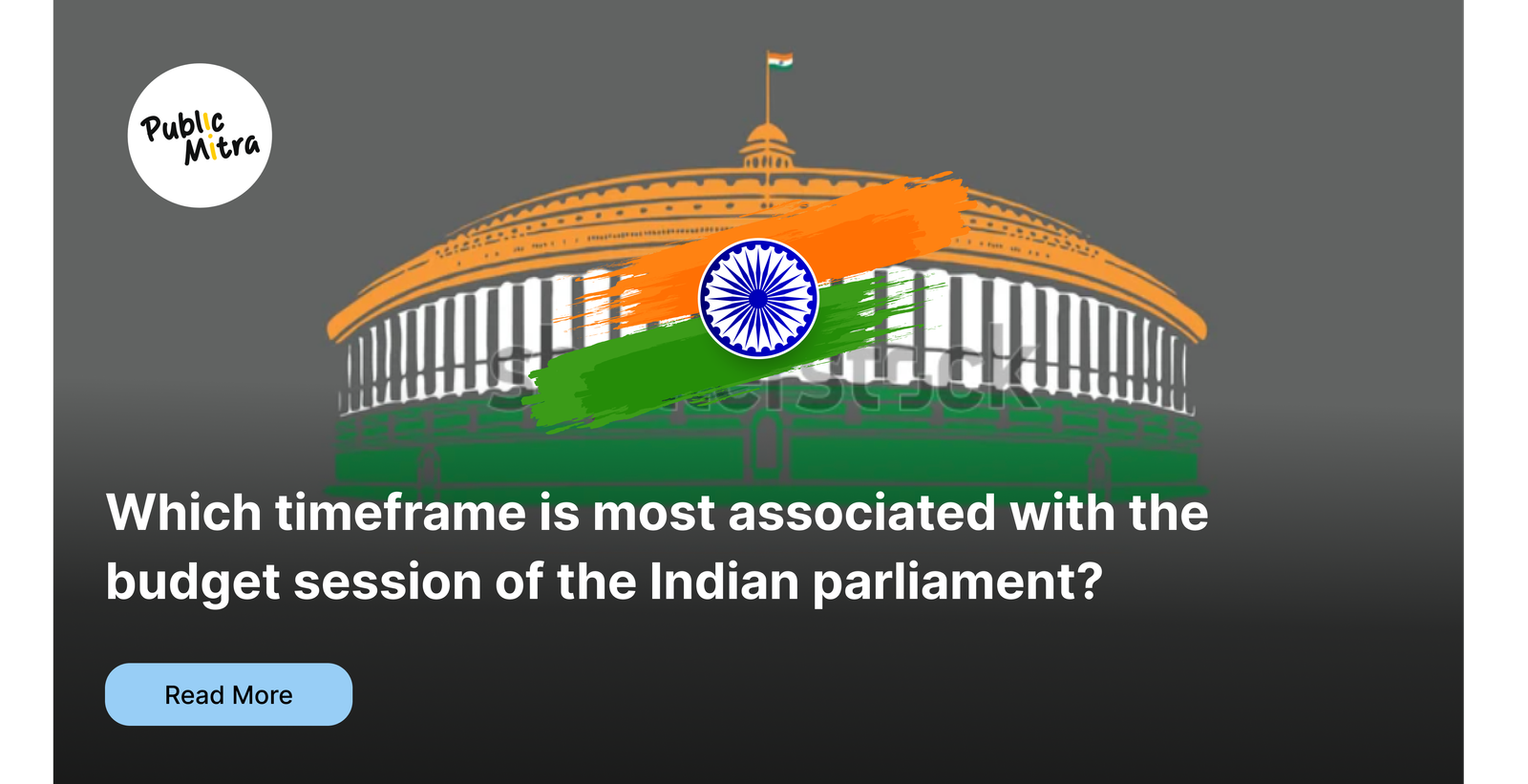Which Timeframe is Most Associated with the Budget Session of the Indian Parliament?
Publicmitra2024-06-27T17:25:11+00:00The Indian Parliament conducts three primary sessions each year:
- Budget Session
- Monsoon Session
- Winter Session
Among these, the Budget Session is considered the most significant due to its critical role in shaping the nation’s economic policies and financial management.
This blog explores the timeframe associated with the Budget Session, detailing its schedule, structure, and importance.
Understanding the Budget Session
The Budget Session is the longest and often the most crucial of the three parliamentary sessions. It typically starts in the last week of January and runs until early April, with a recess in between. This session is dedicated to the presentation, discussion, and passing of the Union Budget, which outlines the government’s revenue and expenditure for the upcoming financial year.
Schedule of the Budget Session
- Inauguration and Presidential Address
The Budget Session usually begins with the President’s Address to both houses of Parliament. This address marks the official commencement of the session and outlines the government’s agenda and priorities for the year.
- Presentation of the Economic Survey
A day before the Union Budget is presented, the Finance Minister tables the Economic Survey. This document provides a detailed analysis of the country’s economic performance over the past year and lays the groundwork for budgetary allocations.
- Presentation of the Union Budget
The Union Budget is typically presented on February 1st by the Finance Minister in the Lok Sabha. This date has been standardised since 2017 to provide ample time for the budget to be implemented from the start of the financial year on April 1st.
- General Discussion
Following the budget presentation, a general discussion takes place in both houses of Parliament. Members debate the budget’s various aspects, including revenue proposals and expenditure plans. This stage allows lawmakers to voice their opinions and suggest amendments.
- Recess
After the general discussion, Parliament usually takes a three-week recess. During this period, the Standing Committees review the budget proposals of various ministries and departments in detail. This phase is crucial for scrutinising and refining the budget.
- Demand for Grants and Appropriation Bill
Post-recess, the session resumes with discussions on the Demand for Grants. Each ministry’s budget allocation is debated, followed by voting. The Appropriation Bill is then introduced, authorising the government to withdraw funds from the Consolidated Fund of India to meet its expenses.
- Finance Bill
The final stage involves the passage of the Finance Bill, which enacts the government’s taxation proposals. Once both the Appropriation and Finance Bills are passed, the budget process is complete.
Importance of the Budget Session
The Budget Session holds immense significance for several reasons:
- The Union Budget is the government’s primary tool for economic planning and policy-making. It sets the direction for fiscal policy, including taxation, subsidies, and public expenditure.
- The detailed discussions and debates during the Budget Session ensure transparency and accountability in the government’s financial operations. Lawmakers scrutinise budget proposals, question the executive, and demand justifications for allocations.
- Apart from the budget, the session also addresses other legislative business. Important bills related to finance, economy, and other sectors are often introduced and debated during this period.
Public and Investor Confidence
The Budget Session influences public and investor confidence. A well-received budget can boost market sentiment, attract investments, and stimulate economic growth.
Challenges Faced During the Budget Session
Despite its importance, the Budget Session is not without challenges:
Political Disruptions
The session often witnesses political disruptions and adjournments. Contentious issues and opposition protests can derail the smooth functioning of the session, delaying budget discussions.
Time Constraint
The extensive scope of the budget, coupled with the limited timeframe, poses a significant challenge. Lawmakers must balance the need for thorough scrutiny with the urgency of passing the budget on time.
Economic Uncertainty
Economic conditions, both domestic and global, can impact budget planning. Unforeseen events like economic downturns, natural disasters, or geopolitical tensions necessitate revisions and adjustments to budget proposals.
Conclusion
The Budget Session of the Indian Parliament, spanning from late January to early April, is a pivotal period in the country’s legislative calendar. It encompasses the presentation, discussion, and approval of the Union Budget, which dictates the financial trajectory of the nation. The session’s structured schedule, comprising the Presidential Address, Economic Survey, budget presentation, general discussion, recess for committee review, and final passage of the Appropriation and Finance Bills, ensures comprehensive scrutiny and accountability.
The Budget Session’s significance extends beyond mere financial planning; it is economic policy-making, transparency, and legislative business. Despite political disruptions and time constraints, the session remains a crucial mechanism for ensuring that the government’s financial policies are well-considered and effectively implemented.












